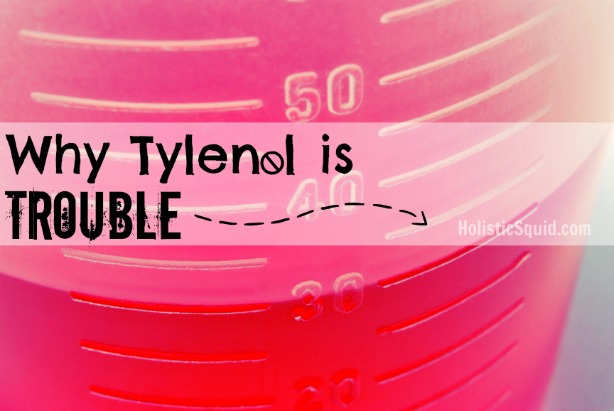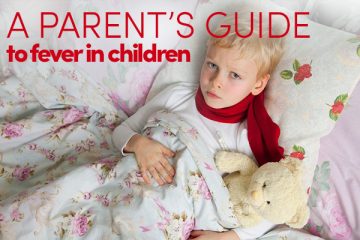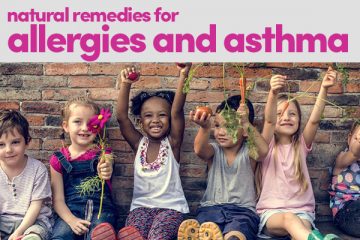
Tylenol for fever sounds like a quick fix to an uncomfortable problem. But if your kiddo is dealing with a fever, skip the Tylenol.
Tylenol, the brand name for acetaminophen, is a popular pain reliever, and it's contained in many medications. Unfortunately, this is a drug that's proven to be harmful to our health and especially dangerous for children.
The real danger of Tylenol
The results of a six year study in the journal Hepatology point out the real dangers associated with Tylenol use. Researchers found that 42% of 662 cases of acute liver failure in 22 clinical settings were caused by acetaminophen poisoning, and 29% of the individuals suffering from acetaminophen toxicity died.
And according to an article at MedScape.com, an over-reliance on Tylenol and overdosing with acetaminophen causes 56,000 emergency room visits, 26,000 hospitalizations and 458 deaths each year.
Even with the best intentions, mistakes happen. And some of the most common medication errors at home – namely overdosing – involve acetaminophen. This means trips to the hospital and in very rare cases death.
In 2001 the American Academy of Pediatrics noted the potential dangers of Tylenol overdose, including total liver failure.
Since it's available over the counter, people believe Tylenol is “safe.” Taking a few extra can't hurt, right? To make things even more confusing, a variety of medications contain acetaminophen, so it's easy to take more than you're realizing unintentionally.
But even when taken at the “correct” dosage, Tylenol causes changes in liver function in some people. Because of genetics and a unique health history, every child metabolizes drugs a little differently.
Tylenol for kids is unsafe and unnecessary
It turns out Tylenol is even more dangerous to kids than adults, as their livers are smaller.
Unfortunately, pediatricians prescribe Tylenol for fever and other ailments regularly. Plus, children's Tylenol products are for sale at pharmacies everywhere. Yet the risks of giving children Tylenol aren't outlined on packages.
It's incredibly easy for parents to accidentally give their kids too high of a dose…and this happens. Often.
Giving children Tylenol is associated with more than potential liver problems or liver failure.
Children who are given acetaminophen frequently are susceptible to an increase in allergic diseases including asthma, eczema, and seasonal allergies. There's even speculation of an increased risk for developing behavioral and learning disorders like autism when receiving Tylenol after vaccines.
I mean, hop over to drugs.com and take a look at what's in Tylenol for children…besides acetaminophen. Note the high fructose corn syrup (just WHY – hello, liver) and synthetic dyes, which are associated with problems in and of themselves:
anhydrous citric acid, butylparaben, D&C red #33, FD&C blue #1, flavor, glycerin, high fructose corn syrup, microcrystalline cellulose and carboxymethylcellulose sodium, propylene glycol, purified water, sodium benzoate, sorbitol solution, xanthan gum
Parents who choose to rely on Tylenol for their children's pain relief are putting their health at risk unnecessarily.
How to manage a fever
There are safe, effective treatment options for fever and typical childhood aches and pains. Instead reducing a fever and your child's health at risk, consult with a holistic health care practitioner to discuss treatments that stimulate healing.
Click here for some reliable ways to get though a fever.
I also recommend trying lemon socks.
Read more on fevers and pain relief meds in this post: Is Reducing A Fever Always Bad?
Here are some natural remedies for headaches.











I’m struggling to find something to replace tylenol. I have a 9 month old and she’s only had tylenol when I can’t find any other solution, do you have any suggestions on something else to use?? What about fevers? any suggestions would be appreciated! btw, i love this blog!
Hi Jacqueline – Glad you’re enjoying the blog! Regarding pain relievers, I use Ibuprofen very sparingly and only when one of my children is in so much pain they can’t rest. A great home remedy for the discomfort of fevers is a lemon water soak for the feet. Basically, you squeeze lemons into hot water, wring out, wrap the child’s feet with the cloths and top with socks. This will help reduce the pain but allow the fever to run it’s course. Most fevers are functional, and shouldn’t be intentionally reduced.
Peppermint oil is also helpful in reducing fevers. Rub it on the bottoms of feet. When mixed worth a variety oil it can also be tubed on their bellies to help with digestive problems.
I should proofread…This goes with my previous post. When mixed with a carrier oil, peppermint oil can be rubbed on the stomach to help relieve all digestive problems.
Just to be safe, peppermint oil shouldn’t be used on kids under 6 (can cause resp. Shutdown) or pregnant women (can elevate blood pressure). Lavender is safe for all ages but be sure to dilute properly especially babies as oils are potent and should be considered similar to any medecine. Research first and better safe than sorry. Do not ingest without consulting a trained professional. Diffusing is the safest. B We love our oils though!!! They see us through a lot!! Just want everyone to be safe 🙂
My daughter’s ND mentioned no peppermint for babies (she’s 6 months). It’s harmful to their respiratory system.
Very interesting article about Tylenol. I do have a question. Unfortunately, when my daughter was 7 she developed Idiopathic Angioedema. She is now unable to tolerate any other pain relievers, no Motrin, NSAID’s, etc. As far as I know, Tylenol is the only thing I can give her for pain relief when she swells. Do you have any suggestions on a pain reliever I could try with her?
I don’t know completely if this works but I’ve heard that ginger is very helpful in reducing inflammation. Maybe see if this works? You would have to find a way she could take it.
What about for teething? When they can’t sleep due to it? Do you use ibuprofen? Any other suggestions? I have a 7 months old who’s going through the throws of teething and having such a hard time!
Try Hyland’s teething tablets, an amber necklace, frozen spoons or washcloths, and lots of mama milk!
To further educate and or help your followers/readers, next time you could include some of those safe, effective treatment options you speak of in the last paragraph.
Good point Kayla. I will add links to more recent posts at the bottom now. Thanks. 🙂
Liver Failure
Liver failure results in the reduced capability of the liver to detoxify the blood of drugs and other toxins. Ibuprofen can exacerbate liver failure and its associated signs and symptoms. Jaundice is the inability of the liver to remove bilirubin from the blood resulting in the yellowing of the skin and eye sclerae. Nausea and vomiting are two side effects that may also occur. The liver works with the kidneys to remove excess fluid from the body, so decreased liver function can lead to edema in the legs
I would have to say that ANY over the counter pain reliever/fever reducer needs to be taken seriously. Tylenol is no more dangerous than Ibuprofen when taken at a different dosage than the label or doctor reccomends. Please, please do not create your own dosage chart…follow the reccomendations!
Read more: Dangerous Side Effects of Ibuprofen in Children | eHow.com http://www.ehow.com/about_5047465_dangerous-side-effects-ibuprofen-children.html#ixzz2MjYr50vp
I don’t use Tylenol for my DD unless she is teething so severely that she wakes several times a night (She’s 18 months) and then, I only put a tiny little bit on my finger and rub it on her gums. We use Hyland’s Teething Tablets for day and night when she’s having problems and have a lot of success with them, as well as the Nuby Nibbler with ice cubes in it for the daytime, but there are times that her teething pain is so awful that only the tylenol on her gums helps her. Can you help me find an alternate solution that we can use (especially in the nighttime) to help her? I don’t really want to use it, but I hate to see her in pain…
My son is about to have his 2nd major surgery and the hospital will most likely give him T3 or Tylenol with codeine. The only other 2 times he has received Tylenol was for surgical procedures, one being neurosurgery in which he got morphine for 3 days, then the Tylenol with codeine, and weaned down to plain Tylenol over a period of 2-3 weeks. This second major surgery is for his cleft palate repair. Ibuprofen was not allowed after his neuro surgery and won’t be allowed after this one either. Major surgeries are the only time I allow Tylenol for either of my boys. I’m not sure that in these special circumstances that anything else will work to cut through the pain, but I would love to know what natural options might work for post-op pain as I would prefer not to use Tylenol, but I also have to keep my child’s pain level down to a point where he will eat and drink and his breathing not become irradic or his heart-rate become tachy. When he did have the pain meds for his neuro surgery, we were able to keep him comfortable on half of the allowable doses and we were also able to stretch doses out more than the every 2 hours that were prescribed.
Jenny – I understand your concern about your son’s surgery and in medicine there is a time and a place for many things that should not be relied upon or overused in day to day life.
Acetaminophen is used for post surgical procedures instead of Ibuprofen. Ibuprofen is a non-steroidal anti-inflammatory drug that should not be used 1 week prior to and 1 week after most surgical procedure as it can affect the platelet function in your blood and affect the ability of the blood to clot. Hope that helps and sets your mind at ease.
I blogged about something similar to this over the weekend. My son had a 103 degree fever and I stood my ground and didn’t medicate. The urgent care doctor even said that she was against Tylenol but did recommend Ibuprofen. I didn’t feel comfortable with that either so let it run its course.
Many of us in the research community are becoming concerned that acetaminophen may be a causal factor in autism spectrum disorder. More research is needed but be cautious with the use of this drug.
The healthcare community has LONG known about the toxic effects on our livers caused by Tylenol. Did they stop binding it to ALL narcotic pain relievers ? Of course not. One can’t get Vicodin or codein without having to ingest at least 500 mg of Tylenol. So, after surgery I just bear it. j&j is all about the profits and not about anyone’s health. My child is 14 and he’s never had Tylenol & I fill out school & camp forms forbidding it. We don’t have it in our house. On the rare occasions he’s had fevers & headaches he gets ibuprofen.
FYI- oxycodone is the opiate pain killer in Percocet. The difference is that there is no Tylenol mixed in. You can ask for this after surgery if you don’t want to ingest Tylenol but still need pain relief. (As I did after my C section).
Vicodin is Tylenol bound to hydrocodone. They do not give this out on its own (hydrocodone is not prescribed on its own). You can get vicoprofin which is hydrocodone bound to ibuprofin. A much safer option.
Being in pain has been shown to slow down healing. So for suffer endlessly after major surgery because you don’t want to take Tylenol. There are many other options.
There are other studies, such as the one done which compared Cuba with the US (Tylenol is script only in Cuba, and vaccines are mandatory). It was found that Autism and delays after vaccination were higher in US where Tylenol is obviously more often used than where it is script only. The results were staggering. I’ll post the link once I find it in my bookmarks. Tylenol is dangerous because it decreases the body’s master antioxidant, glutathione. This should be covered in this post. Without glutathione, the body cannot detox out the adjuvants and other chemicals in vaccines. Ibuprophen does not deplete glutathione like Tylenol does.
are there natural suggestions then ? we know the medicine isn’t the best. but what natural works as quickly and as effectively as baby ibuprofen ? that is safe for a breastfeeding toddler ? When they have a big fall and are bleeding and screaming obviously parents want to help them quickly, so what natural can be given in lieu of the ibuprofen ? any suggestions ? what have people had success with please ?
Hello,
After reading your article, I am left with many questions. You make several major claims, yet only reference one study. It appears that the data from the study is also misrepresented. It would be good to inform readers that the 42% of patients whose acute liver failure was believed to be secondary to acetaminophen toxicity, had a median acetaminophen intake of 24 grams. It is also of note that this study does not adequately examine acetaminophen hepatotoxicity in pediatric patients, as the youngest patient included in the study was 17 years old. Do you have any other research that will support your claims? I am also unable to locate any efficacy studies comparing nonpharmocologic treatment modalities with acetaminophen for fever or pain. Of course, all treatments have associated risks, but claiming that children should not receive Tylenol when it is indicated, is extreme without supporting evidence. Thank you for your time.
Hey Owen,
There’s nothing extreme about the hazards of Tylenol on a little’s one health. The science is there. For me, the bottom line is that there are ways to fight infection and reduce fever that are completely safe and without side effects.
Overdose, which can lead to liver failure, is common: “Acetaminophen overdose is a major cause of acute liver failure and is the most common identifiable cause of acute liver failure in children”
https://doi.org/10.1503/cmaj.111338
An unclear understanding of the product is common:
https://doi.org/10.1331/JAPhA.2014.13077
And this metaanalysis suggests a relation to the development of asthma: https://doi.org/10.1378/chest.09-0865
Thanks for your comment and all the best!
Emily xoxo
Acetaminophen may very well be a main trigger for certain childhood neurological disorders, including autism, as well as childhood asthma. Do the research yourself. A good place to start is with the link below:
http://paulthomasmd.com/2015/08/24/acetaminophen-paracetamol-dangerous-for-pregnancy-and-young-children/
buy instagram hacklink followers.